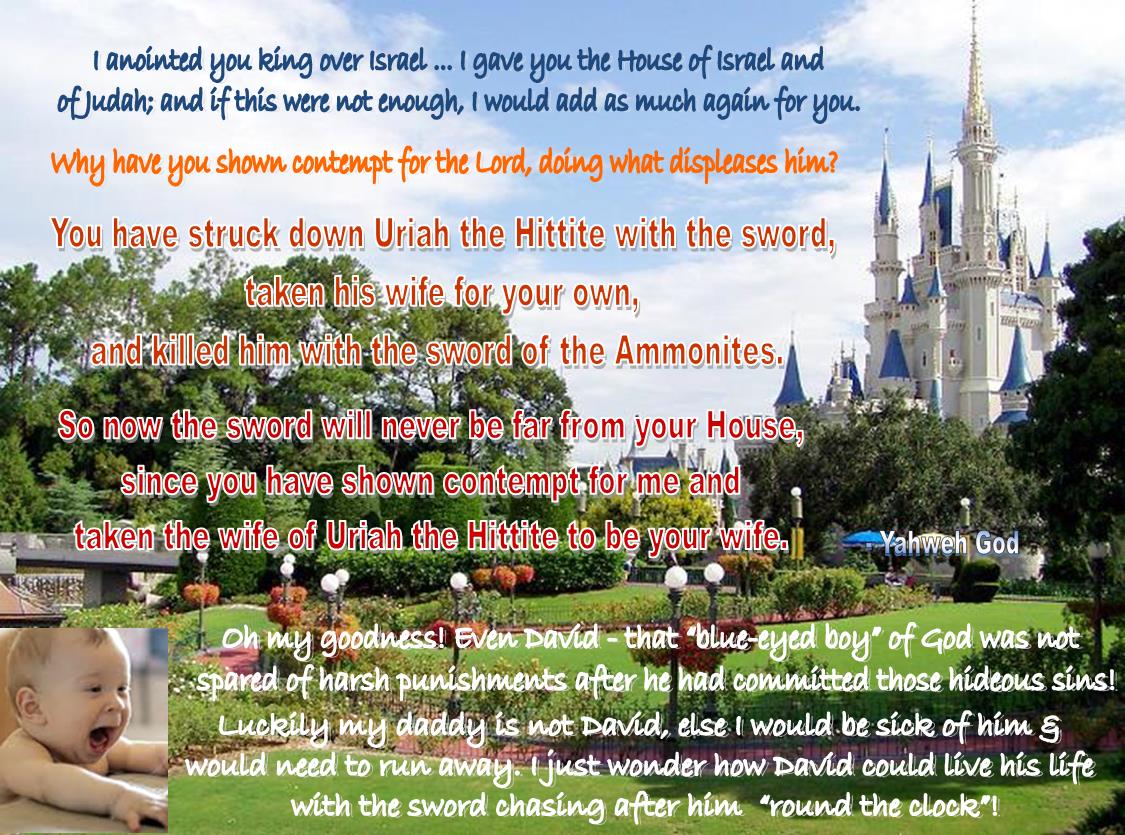|
14 |

|
20 June 2013 Extracted from the 2nd book of Samuel 12:7-10,13: Nathan said to David, ‘The Lord the God of Israel says this, “I anointed you king over Israel; I delivered you from the hands of Saul; I gave your master’s house to you, his wives into your arms; I gave you the House of Israel and of Judah; and if this were not enough, I would add as much again for you. Why have you shown contempt for the Lord, doing what displeases him? You have struck down Uriah the Hittite with the sword, taken his wife for your own, and killed him with the sword of the Ammonites. So now the sword will never be far from your House, since you have shown contempt for me and taken the wife of Uriah the Hittite to be your wife.”’ David said to Nathan, ‘I have sinned against the Lord.’ Then Nathan said to David, ‘The Lord, for his part, forgives your sin; you are not to die.’
After note: See what happened to king David after he had committed adultery with Uriah’s wife, murdered Uriah and had taken her to be his own > Encouragements-34. This is the life story of David, who had been greatly blessed by God but chose to disobey Wisdom and followed his perverted passions; eventually he brought disaster to himself and great misfortune to his own house. Do you see such people around us? 8-(
What’s the advantage of obtaining Wisdom? Extracted from Ecclesiasticus / Sirach Chapter 6: 18 My child, from your earliest youth choose instruction, and till your hair is white you will keep finding wisdom.
19 Like ploughman and sower, cultivate her and wait for her fine harvest, for in tilling her you will toil a little while, but very soon you will be eating her crops.
20 How very harsh she is to the undisciplined! The senseless does not stay with her for long:
21 she will weigh as heavily on the senseless as a touchstone and such a person will lose no time in throwing her off;
22 for Wisdom is true to her name, she is not accessible to many.
23 Listen, my child, and take my advice, do not reject my counsel:
24 put your feet into her fetters, and your neck into her collar;
25 offer your shoulder to her burden, do not be impatient of her bonds;
26 court her with all your soul, and with all your might keep in her ways;
27 search for her, track her down: she will reveal herself; once you hold her, do not let her go.
28 For in the end you will find rest in her and she will take the form of joy for you:
29 her fetters you will find a mighty defence, her collars, a precious necklace.
30 Her yoke will be a golden ornament, and her bonds be purple ribbons;
31 you will wear her like a robe of honour, you will put her on like a crown of joy. |

|
Psalm 32:1-2,5,7,11 Forgive, Lord, the guilt of my sin.
Happy the man whose offence is forgiven, whose sin is remitted. O happy the man to whom the Lord imputes no guilt, in whose spirit is no guile.
But now I have acknowledged my sins; my guilt I did not hide. I said: ‘I will confess my offence to the Lord.’ And you, Lord, have forgiven the guilt of my sin.
You are my hiding place, O Lord; you save me from distress. You surround me with cries of deliverance.
Rejoice, rejoice in the Lord, exult, you just! O come, ring out your joy, all you upright of heart. |

|
Extracted from the letter of Saint Paul to the Galatians 2:16,19-21: We acknowledge that what makes a man righteous is not obedience to the Law, but faith in Jesus Christ. We had to become believers in Christ Jesus no less than you had, and now we hold that faith in Christ rather than fidelity to the Law is what justifies us, and that no one can be justified by keeping the Law. In other words, through the Law I am dead to the Law, so that now I can live for God. I have been crucified with Christ, and I live now not with my own life but with the life of Christ who lives in me. The life I now live in this body I live in faith: faith in the Son of God who loved me and who sacrificed himself for my sake. I cannot bring myself to give up God’s gift: if the Law can justify us, there is no point in the death of Christ.
Sharing: Don’t be mistaken, the aforesaid letter from Saint Paul is not telling us that we do not need to keep the 10 Commandments & to live a righteous life in order to enter God’s Kingdom. According to Church Approved Bible Commentary, Paul is telling us that keeping the Law (the legal observances of the Torah i.e. the first 5 books of the Hebrew Bible: Genesis, Exodus, Leviticus, Numbers and Deuteronomy) is not able to make us righteous in the eyes of God but “Faith in Jesus Christ” which requires all of us to keep His Law of Love and live as He wants us to live - summarized in the Sermon of the Mount (Matthew 5:1-12) (see Encouragements-158). Observe also how the third section of the Sermon on the Mount (Matthew 6:19-7:27) concerning the righteousness of the disciples covers three zones: ¨ the first part of the material deals with the eyes-heart (Mathew 6:19-7:6), ¨ the second with mouth-ears (Matthew 7:7-11), ¨ and the last section with hands-feet (Matthew 7:13-27). Saint John tells us “If you consider that God is righteous, you also know that everyone who acts in righteousness is begotten by him.” (1 John 2:29) (See Encouragements-65). Well, does it mean that if we “live otherwise”, we would belong to “the other party”? You may want to read what Saint John says in his letter: 1 John 3:7-10 (Extracted in Encouragements-66). Well, this is a high ideal that many of us; including myself, are striving to achieve with God’s grace - it is for the brave ones who are determined to be faithful to God’s Grace and dare to take up the challenge of swimming against the current. 8-) |

|
Extracted from the holy Gospel according to Luke 7:36-8:3: One of the Pharisees invited Jesus to a meal. When he arrived at the Pharisee’s house and took his place at table, a woman came in, who had a bad name in the town. She had heard he was dining with the Pharisee and had brought with her an alabaster jar of ointment. She waited behind him at his feet, weeping, and her tears fell on his feet, and she wiped them away with her hair; then she covered his feet with kisses and anointed them with the ointment. When the Pharisee who had invited him saw this, he said to himself, ‘If this man were a prophet, he would know who this woman is that is touching him and what a bad name she has.’ Then Jesus took him up and said, ‘Simon, I have something to say to you.’ ‘Speak, Master’ was the reply. ‘There was once a creditor who had two men in his debt; one owed him five hundred denarii, the other fifty. They were unable to pay, so he pardoned them both. Which of them will love him more?’ ‘The one who was pardoned more, I suppose’ answered Simon. Jesus said, ‘You are right.’ Then he turned to the woman. ‘Simon,’ he said ‘you see this woman? I came into your house, and you poured no water over my feet, but she has poured out her tears over my feet and wiped them away with her hair. You gave me no kiss, but she has been covering my feet with kisses ever since I came in. You did not anoint my head with oil, but she has anointed my feet with ointment. For this reason I tell you that her sins, her many sins, must have been forgiven her, or she would not have shown such great love. It is the man who is forgiven little who shows little love.’ Then he said to her, ‘Your sins are forgiven.’ Those who were with him at table began to say to themselves, ‘Who is this man, that he even forgives sins?’ But he said to the woman, ‘Your faith has saved you; go in peace.’ Now after this he made his way through towns and villages preaching, and proclaiming the Good News of the kingdom of God. With him went the Twelve, as well as certain women who had been cured of evil spirits and ailments: Mary surnamed the Magdalene, from whom seven demons had gone out, Joanna the wife of Herod’s steward Chuza, Susanna, and several others who provided for them out of their own resources.
|